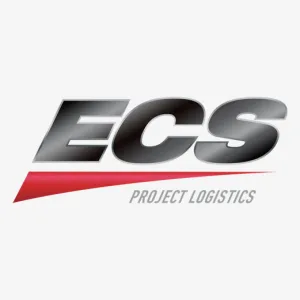On a mission to build a sustainable water future, we revisit Osmoflo and its passion for preserving the world’s most precious resource. Carmine Ciccocioppo, CEO, tells us about the company’s recent endeavours and plans for future success.
A CIRCULAR FUTURE FOR WATER
“Water is fundamental to life, and every day our water treatment systems are vital to the well-being of thousands of people around the world.”
Water scarcity is a growing issue that continues to affect communities worldwide.
The need to address this problem and provide innovative, sustainable, and long-term solutions is one that companies like Osmoflo are tackling, as voiced by Carmine Ciccocioppo, CEO.
Established in 1991, Osmoflo has specialised in the design, build, and operation of over 650 reverse osmosis desalination and advanced recycling plants, alongside operating and maintaining approximately 100 plants on behalf of global clients. Its headquarters are based in Adelaide, with operations across Australia, the Middle East, India, and Asia.
The company’s mission is to provide value-based water solutions that contribute to a circular economy, which it carries out by offering a range of water treatment services with a whole-of-life management approach.
Services include large-scale customised project solutions, emergency water rentals, and the operation and maintenance of plants, complemented by innovative technology and strategic growth initiatives.
“Osmoflo boasts an extensive portfolio of high-quality clients, customers, partners, vendors, and collaborators around the globe, supported by our Osaka-headquartered parent company, Kanadevia Corporation (KVC),” details Ciccocioppo.
Having last spoken to Ciccocioppo in 2022, he confirms that the global water sector remains an immensely exciting place to be, with the entire industry facing enormous and unprecedented challenges – the largest of which is climate change.
The impact of this environmental phenomenon is manifesting in two ways, the first of which is the growing threats to the reliability of traditional sources of surface and groundwater. Second is the severity and frequency of extreme climate events, which are testing the capacity, resilience, and reliability of existing water supply and sanitation infrastructure.
Additionally, the water sector is facing other significant challenges, such as rapidly ageing infrastructure, making innovation and adaptability key to sustaining and optimising these assets.
At the same time, the industry is looking to steadily decarbonise by seeking increasingly energy-efficient and circular options to support ongoing operations.
“The role of infrastructure and technology solution providers like Osmoflo is as important as ever, as is the need for industry-wide collaboration, and there has never been a more exciting time to be a water industry practitioner,” states Ciccocioppo.
“Water is fundamental to life, and every day our water treatment systems are vital to the well-being of thousands of people around the world”
Carmine Ciccocioppo, CEO, Osmoflo
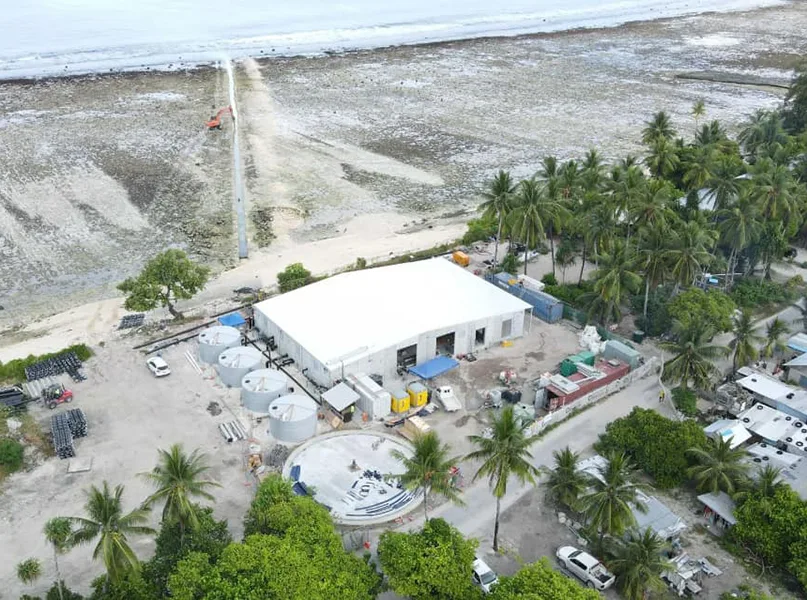
ADDRESSING WATER SCARCITY
When rebranding in 2022, Osmoflo adopted its ‘A Circular Future for Water’ tagline, highlighting the company’s commitment to making a significant contribution to a sustainable future where all water needs are met.
“These concepts are fundamental to how we approach every challenge – in other words, the needs of all our global stakeholders, whether they are individuals, organisations, or the environment, must be met sustainably,” expands Ciccocioppo.
The company aims to minimise waste and harness as much as possible from its treatment processes, thereby minimising non-regenerative and non-renewable inputs to ensure that the choices made don’t burden future generations.
Osmoflo accomplishes this goal by using nearly 35 years of experience and over 650 project references to work closely with clients to meet complex, specific requirements.
As a tailored solutions provider for water treatment, desalination, and advanced reuse applications, the company is always focused on minimising total cost of ownership and delivering the lowest long-run, risk-weighted marginal cost of water.
“That means designing and delivering plants that provide the right quantity and quality of water, whenever it’s needed, for decades into the future,” asserts Ciccocioppo.
For many private and public sector organisations and asset owners, their focus is on the up-front capital cost of such infrastructure. However, what they tend to overlook is that the capital cost accounts for as little as 30 to 40 percent of the long-run marginal cost of water, depending on the overall asset life, target levels of asset availability, and complexity of the treatment process.
“Our objective is to always work collaboratively with our clients to look at the bigger picture and carefully consider the long-term costs and risks of their water needs,” informs Ciccocioppo.
Equally as significant to Osmoflo’s process are its five core values – being agile, quality-driven, team-oriented, innovative, and committed – which drive the company’s focus, day-to-day decision-making, and fundamental value proposition to clients.
The company’s commitment to innovation is embedded deeply into its corporate DNA, and it invests strongly in fundamental R&D, collaborating with leading academic institutions and scouring the global technology space for market-leading technologies that can be adopted and integrated into solutions.

“The role of infrastructure and technology solution providers like Osmoflo is as important as ever, as is the need for industry-wide collaboration, and there has never been a more exciting time to be a water industry practitioner”
Carmine Ciccocioppo, CEO, Osmoflo
GLOBAL WATER TREATMENT SOLUTIONS
To address global water scarcity and the growing need for water treatment solutions during urgent situations, Osmoflo is utilising a fleet of emergency treatment equipment for critical projects.
“As climate extremes are continuing to increase and place escalating pressure on traditional sources of water, we are seeing more examples of utilities and private sector organisations being faced with unprecedented challenges to the resilience and capacity of their existing water and wastewater infrastructure,” details Ciccocioppo.
Osmoflo’s emergency water rental fleet can greatly assist during critical periods by providing a range of brackish water and seawater systems, with pre-treatment, post-treatment, and demineralisation options to deliver fit-for-purpose water with very short lead times.
“Any emergency water needs, capacity increases, water quality improvements, or environmental factors are where Osmoflo’s offering can provide services and support,” he informs.
Alongside the company’s emergency water rental fleet, it is engaging in various projects to further its footprint in the wider Pacific region, the rental space, and the Australian municipal sector.
Specifically, Osmoflo’s successful plants, operations and maintenance, remote monitoring, and on-site training in Kiribati and the Marshall Islands are an example of its ability to deliver bespoke water plants to challenging environments whilst ensuring reliability and performance in line with design life.
In Kiribati, a significant milestone was recently reached with the delivery of the first water from the McKenzie seawater reverse osmosis (SWRO) plants, designed and delivered by Osmoflo in collaboration with its joint venture partner CCB Envico, into South Tarawa’s drinking water distribution system.
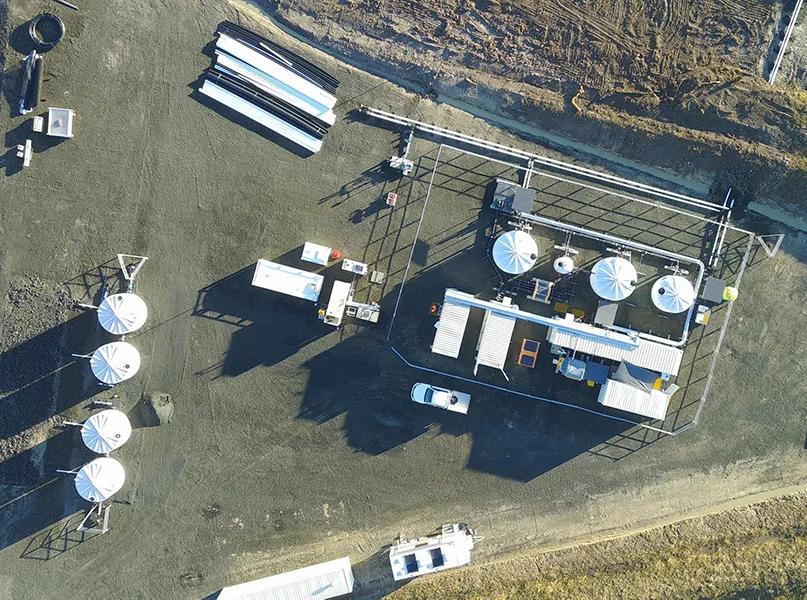
“This achievement marks a critical step forward in addressing the region’s long-standing water scarcity issue, providing ongoing access to sustainable, reliable, and high-quality potable water for the local community,” highlights Ciccocioppo.
With this milestone, Osmoflo has demonstrated its commitment to increasing sustainable water production and will continue to support ongoing efforts to enhance infrastructure, build skills and capacity in the local community, and improve water accessibility for the entire nation.
Elsewhere, the company is working on nationally significant, large-scale projects, including the Coastal Water Supply Sustaining Project for Rio Tinto in Western Australia (WA), which comprises two separate phases of 12 megalitres per day (MLD)-capacity ultrafiltration (UF)-SWRO plants to provide potable quality water for both Rio Tinto’s own port operations in Dampier as well as drinking water for surrounding communities in the Pilbara region.
Additionally, Osmoflo is acting as a technology provider for the John Holland Group and Hunter Water Corporation to deliver the 30 MLD Belmont Desalination Plant, which will help provide a vital, climate-independent water source for the Greater Newcastle region.
“These projects serve as examples of our growing capability to deliver large-scale, high-quality infrastructure solutions for both the resources and municipal sectors,” states Ciccocioppo.
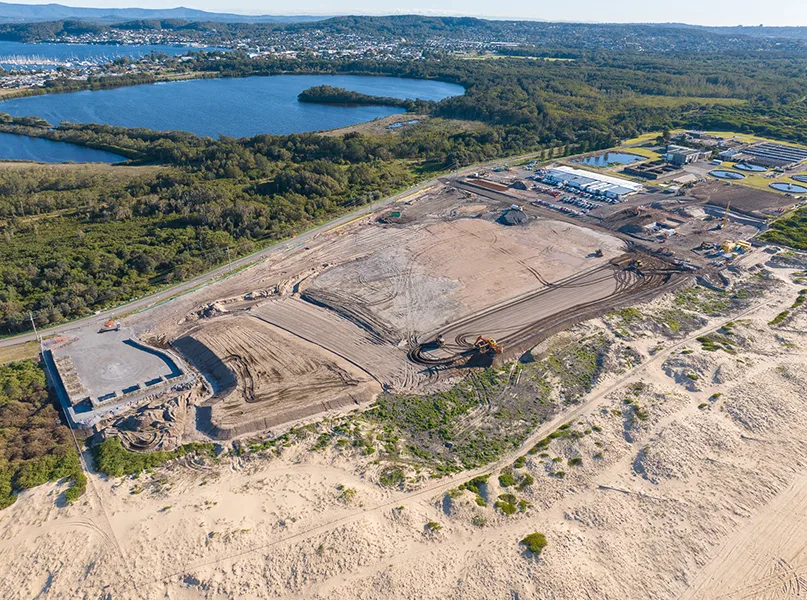
CREATING A CIRCULAR ECONOMY
Osmoflo recognises that its success stems from the continual dedication and hard work of its staff members.
“As a service-oriented and solutions-driven company, our staff are critically important. Our numbers have increased significantly in the last year in response to strong company growth within both our projects business and operations division,” specifies Ciccocioppo.
Focused on providing its team with rewarding and challenging careers, Osmoflo is investing in their professional development and ensuring remuneration is competitive against industry benchmarks.
In parallel, when it comes to inclusivity and diversity, Osmoflo is strongly committed to constantly improving the gender equity and diversity of its global workforce. In its Australian business alone, around 30 nationalities and cultures are represented, with staff originating from all corners of the globe.
Equally as significant is Osmoflo’s emphasis on corporate social responsibility (CSR) and environmental sustainability.
One such example is WaterAid – an international not-for-profit organisation working to provide clean water, decent toilets, and good hygiene to people in developing countries.
With the goal of making these essential services a normal part of daily life, Osmoflo has been a strong supporter and consistent contributor to WaterAid.
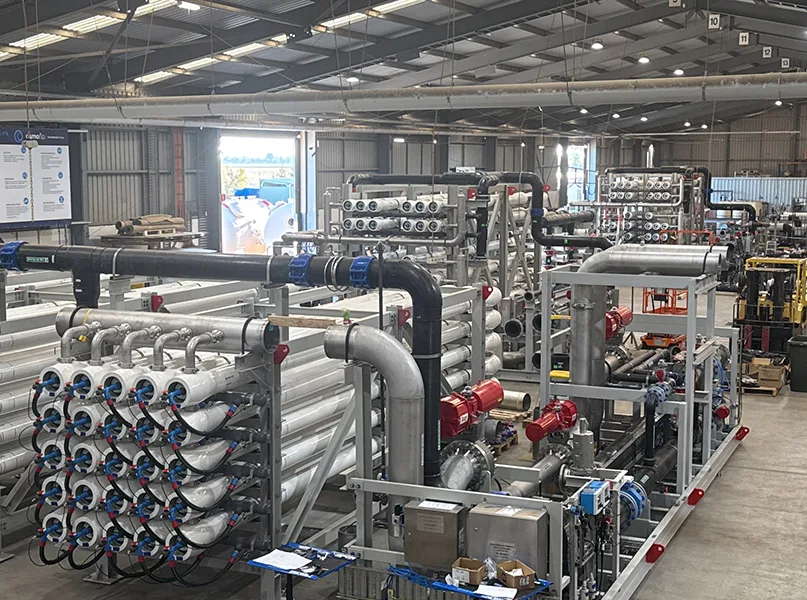
“Relationships like this show our commitment to future-proofing the global water treatment sector and ensuring all global communities have access to the basic human rights of clean drinking water and sanitation that many developed nations take for granted,” explains Ciccocioppo.
Additionally, Osmoflo is well-suited to assist in times of crisis through its emergency rental offering. In 2023, when Turkey was hit by a series of devastating earthquakes, the company donated three containerised water treatment and desalination plants to provide relief and access to safe drinking water for thousands of displaced locals, with quick deployment of its readily available rental assets.
This initiative was highlighted at the 2024 International Desalination Reuse Association (IDRA) World Congress, presenting Osmoflo with an award as the CSR leader for addressing global water scarcity in times of crisis.
As the company continues to look towards a more sustainable and innovative future, it is focusing on three primary themes – strengthening, diversifying, and growing the business. Osmoflo is further investing in its systems, procedures, and people to provide strength to the business and enable it to ‘flex up’ and ‘spread wider’ as it steadily increases the sales, diversity, and geographic spread of its business.
“Overall, we are looking to at least double the size of the existing business by 2030 through a combination of organic and inorganic growth as well as geographic, product, and technology diversification – the future is definitely an exciting one for Osmoflo!” Ciccocioppo positively concludes.





